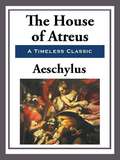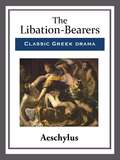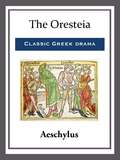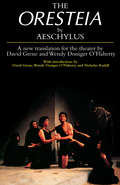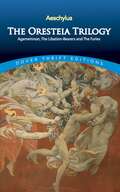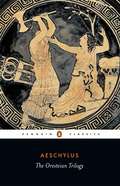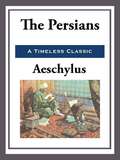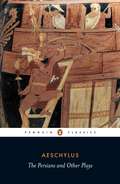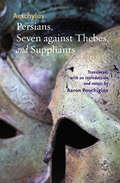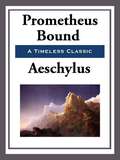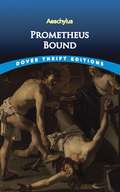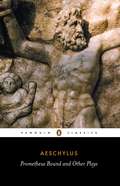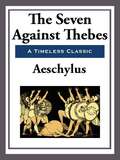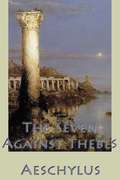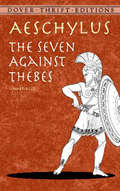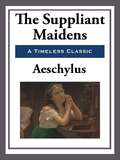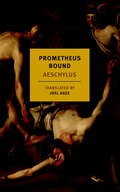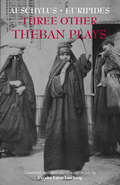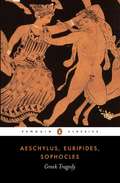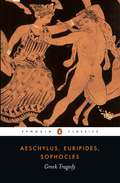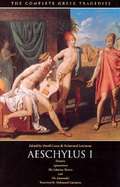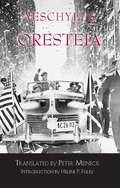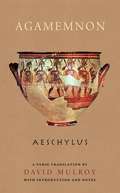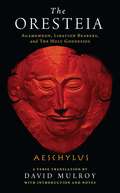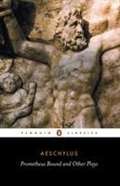- Table View
- List View
The House of Atreus
by AeschylusAeschylus was a Greek playwright considered to be the founder of the tragedy. Aeschylus along with Sophocles and Euripides are the three major Greek tragedians whose plays have survived. Before Aeschylus, characters in a play only interacted with the chorus. Aeschylus expanded the number of actors allowing for interaction among the characters. Seven of his 92 plays have survived. The Persian invasion of Greece, which took place during his lifetime, influenced many of his plays. The Oresteia is a trilogy of Greek tragedies written by Aeschylus, which concerns the end of the curse on the House of Atreus. The plays were "Agamemnon," "Choephorae" (The Libation-Bearers), and the "Eumenides" (Furies).
The Liberation-Bearers
by AeschylusThis classic trilogy by the great tragedian deals with the bloody history of the House of Atreus. Grand in style, rich in diction and dramatic dialogue, the plays embody Aeschylus' concerns with the destiny and fate of both individuals and the state, all played out under the watchful eye of the gods.
The Oresteia
by AeschylusAeschylus was the first of the three ancient Greek tragedians whose plays can still be read or performed, the others being Sophocles and Euripides. He is often described as the father of tragedy: our knowledge of the genre begins with his work and our understanding of earlier tragedies is largely based on inferences from his surviving plays. Only seven of his estimated seventy to ninety plays have survived into modern times. Fragments of some other plays have survived in quotes and more continue to be discovered on Egyptian papyrus, often giving us surprising insights into his work.
The Oresteia: Agamemnon, Women At The Graveside, Orestes In Athens (Oleander Language And Literature Ser. #Vol. 18)
by AeschylusHighly acclaimed as translators of Greek and Sanskrit classics, respectively, David Grene and Wendy Doniger O'Flaherty here present a complete modern translation of the three plays comprising Aeschylus' Orestia and, with the assistance of director Nicholas Rudall, an abridged stage adaptation. This blanced and highly successful collaboration of scholars with a theater director solves the contemporary problems of translating and staging the Orestia, which originally was written to be performed in Athens in the first half of the fifth century B.C. While remaning faithful to the original Greek, Grene and O'Flaherty embrace a strong and adventurous English style, vivid and visceral. The language of this extraordinary translation, immediately accessible to a theater audience, speaks across the centuries. Premiered at Chicago's Court Theater in 1986 under Rudall's direction, the stage adaptation of the Orestia proved eminently playable. This new adaptation of the orestia offers a brilliant demonstration of how clearly defined goals (here, the actor's needs) can inspire translators to produce fresh, genuine, accessible dramatic texts. The resulting work provides complete and accurate texts for those who cannot read the original Greek, and it transforms the Orestia into an effective modern stage play. With interpretive introductions written by the translators and director, this new version will be welcomed by teachers of translation courses, by students of Greek and world drama in general, and by theater professionals.
The Oresteia Trilogy: Agamemnon, the Libation-Bearers and the Furies (Dover Thrift Editions Ser.)
by AeschylusClassic trilogy by great tragedian deals with the bloody history of the House of Atreus. Grand in style, rich in diction and dramatic dialogue, the plays embody Aeschylus' concerns with the destiny and fate of both individuals and the state, all played out under the watchful eye of the gods.
The Oresteian Trilogy
by AeschylusAeschylus (525-c.456 bc) set his great trilogy in the immediate aftermath of the Fall of Troy, when King Agamemnon returns to Argos, a victor in war. Agamemnon depicts the hero's discovery that his family has been destroyed by his wife's infidelity and ends with his death at her callous hand. Clytemnestra's crime is repaid in The Choephori when her outraged son Orestes kills both her and her lover. The Eumenides then follows Orestes as he is hounded to Athens by the Furies' law of vengeance and depicts Athene replacing the bloody cycle of revenge with a system of civil justice. Written in the years after the Battle of Marathon, The Oresteian Trilogy affirmed the deliverance of democratic Athens not only from Persian conquest, but also from its own barbaric past.
The Persians
by AeschylusThe Persians is an Athenian tragedy by the ancient Greek playwright Aeschylus. First produced in 472 BC, it is the oldest surviving play in the history of theatre. It dramatises the Persian response to news of their military defeat at the Battle of Salamis (480 BC), which was a decisive episode in the Greco-Persian Wars; as such, the play is also notable for being the only extant Greek tragedy that is based on contemporary events.
The Persians and Other Plays: The Persians / Prometheus Bound / Seven Against Thebes / The Suppliants
by AeschylusAeschylus (525-456 BC) brought a new grandeur and epic sweep to the drama of classical Athens, raising it to the status of high art. The Persians, the only Greek tragedy to deal with events from recent Athenian history, depicts the final defeat of Persia in the battle of Salamis, through the eyes of the Persian court of King Xerxes, becoming a tragic lesson in tyranny. In Prometheus Bound, the defiant Titan Prometheus is brutally punished by Zeus for daring to improve the state of wretchedness and servitude in which mankind is kept. Seven Against Thebes shows the inexorable downfall of the last members of the cursed family of Oedipus, while The Suppliants relates the pursuit of the fifty daughters of Danaus by the fifty sons of Aegyptus, and their final rescue by a heroic king.
Persians, Seven against Thebes, and Suppliants (Johns Hopkins New Translations from Antiquity)
by AeschylusAaron Poochigian’s new translations of Aeschylus’s earliest extant plays provide the clearest rendering yet of their formal structure. The distinction between spoken and sung rhythms is as sharp as it is in the source texts, and for the first time readers in English can fully grasp the balanced, harmonious arrangement of choral odes. The importance of these works to the history of drama and tragedy and to the history of classical literature is beyond question, and their themes of military hubris and foreign versus native are deeply relevant today. Persians offers a surprisingly sympathetic portrayal of the Athenians’ most hated enemy; in Seven against Thebes Argive invaders, though no less Greek than the Thebans themselves, are portrayed as barbarians; and in Suppliants the city of Argos is called upon to protect Egyptian refugees. Based on textual evidence and the archaeological remains of the Theater of Dionysus at Athens, Poochigian’s introductory overview of stage properties and accompanying stage directions allow readers to experience the plays as they were performed in their own time. He is most careful in his translations of the plays’ choral odes. Instead of rendering them with little or no form, Poochigian has preserved the comprehensive structures Aeschylus himself employed. Readers are thus able to recognize Aeschylus as a master of poetry as well as of drama. Poochigian’s translations are the most accurate renditions of the poetry and dramaturgy of the original works available. Intended to be both read as literature and performed as plays, these translations are lucid and readable, while remaining staunchly faithful to the texts.
Prometheus Bound
by AeschylusAeschylus based his epic drama on the legendary tale of Prometheus, the Titan who stole fire from the gods for the benefit of humanity. Prometheus's terrible punishment remains a universal symbol of human vulnerability in any struggle with the gods, and this ancient play continues to entrance audiences with its timeless appeal.
Prometheus Bound: Translated From The Greek (classic Reprint) (Dover Thrift Editions)
by AeschylusIn Greek legend, Prometheus was the Titan who, against the will of Zeus, stole fire from the gods for the benefit of man. His terrible punishment by Zeus, and his continuing defiance of Zeus in the face of that punishment, remain universal symbols of man's vulnerability in any struggle with the gods.In the epic drama Prometheus Bound, Aeschylus (c. 525-456 BC), first of the three great Greek tragic poets, re-creates this legendary conflict between rebellious subject and vengeful god. Chained for eternity to a barren rock, his flesh repeatedly torn by a ravaging eagle, Prometheus defends his championship of mankind, rejoicing in the many gifts of language and learning he has given man despite Zeus's cruel opposition.Inspired by Prometheus's spirit, Aeschylus reaches beyond the myth to create one of literature's most gripping portrayals of man's inhumanity to man. How Prometheus clings to his convictions and braves his harsh fate give Prometheus Bound its extraordinary vitality and appeal. For over 2,000 years, this masterpiece of drama has held audiences enthralled. It is reprinted here in its entirety from the translation by George Thomson.
Prometheus Bound and Other Plays: The Persians / Prometheus Bound / Seven Against Thebes / The Suppliants (The\complete Greek Tragedies Ser.)
by AeschylusAeschylus (525–456 BC) brought a new grandeur and epic sweep to the drama of classical Athens, raising it to the status of high art. In Prometheus Bound the defiant Titan Prometheus is brutally punished by Zeus for daring to improve the state of wretchedness and servitude in which mankind is kept. The Suppliants tells the story of the fifty daughters of Danaus who must flee to escape enforced marriages, while Seven Against Thebes shows the inexorable downfall of the last members of the cursed family of Oedipus. And The Persians, the only Greek tragedy to deal with events from recent Athenian history, depicts the aftermath of the defeat of Persia in the battle of Salamis, with a sympathetic portrayal of its disgraced King Xerxes.Philip Vellacott’s evocative translation is accompanied by an introduction, with individual discussions of the plays, and their sources in history and mythology.
The Seven Against Thebes
by AeschylusThird play of a trilogy (the other two are lost) about the doomed family of Laius and Oedipus and his sons. After the city of Thebes has banished Oedipus, the former ruler's sons vie for the crown. The victor, Eteocles, expels his brother, Polyneices, who then recruits 7 champions to lead an assault on Thebes, with a tragic results.
The Seven Against Thebes
by AeschylusAeschylus was the first of the three ancient Greek tragedians whose plays can still be read or performed, the others being Sophocles and Euripides. He is often described as the father of tragedy: our knowledge of the genre begins with his work and our understanding of earlier tragedies is largely based on inferences from his surviving plays. Only seven of his estimated seventy to ninety plays have survived into modern times. Fragments of some other plays have survived in quotes and more continue to be discovered on Egyptian papyrus, often giving us surprising insights into his work.
The Seven Against Thebes: When A Man's Willing And Eager The God's Join In (Dover Thrift Editions Ser.)
by AeschylusThird play of a trilogy (the other two are lost) about the doomed family of Laius and Oedipus and his sons. After the city of Thebes has banished Oedipus, the former ruler's sons vie for the crown. The victor, Eteocles, expels his brother, Polyneices, who then recruits 7 champions to lead an assault on Thebes, with a tragic results.
The Suppliant Maidens
by AeschylusIn the play, the Danaids, the fifty daughters of Danaus, founder of Argos, flee a forced marriage to their cousins in Egypt. They turn to King Pelasgus of Argos for protection, but Pelasgus refuses until the people of Argos weigh in on the decision, a distinctly democratic move on the part of the king. The people decide that the Danaids deserve protection, and they are allowed within the walls of Argos despite Egyptian protests.
Prometheus Bound
by Aeschylus Joel AgeePrometheus Bound is the starkest and strangest of the classic Greek tragedies, a play in which god and man are presented as radically, irreconcilably at odds. It begins with the shock of hammer blows as the Titan Prometheus is shackled to a rock in the Caucasus. This is his punishment for giving the gift of fire to humankind and for thwarting Zeus's decision to exterminate the human race. Prometheus's pain is unceasing, but he refuses to recant his commitment to humanity, to whom he has also brought the knowledge of writing, mathematics, medicine, and architecture. He hints that he knows how Zeus will be brought low in the future, but when Hermes demands that Prometheus divulge his secret, he refuses and is sent spinning into the abyss by a divine thunderbolt. To whom does humanity look for guidance: to the supreme deity or to the rebel Titan? What law controls the cosmos? Prometheus Bound, one of the great poetic achievements of the ancient world, appears here in a splendid new translation by Joel Agee that does full justice to the harsh and keening music of the original Greek.
Three Other Theban Plays: Aeschylus' Seven Against Thebes; Euripides' Suppliants; Euripides' Phoenician Women
by Aeschylus EuripidesThough now associated mainly with Sophocles' Theban Plays and Euripides' Bacchae, the theme of Thebes and its royalty was a favorite of ancient Greek poets, one explored in a now lost epic cycle, as well as several other surviving tragedies. With a rich Introduction that sets three of these plays within the larger contexts of Theban legend and of Greek tragedy in performance, Cecelia Eaton Luschnig’s annotated translation of Aeschylus' Seven Against Thebes, Euripides' Suppliants, and Euripides' Phoenician Women offers a brilliant constellation of less familiar Theban plays—those dealing with the war between Oedipus’ sons, its casualties, and survivors.
Greek Tragedy
by Aeschylus Euripides SophoclesThree masterpieces of classical tragedy Containing Aeschylus's Agamemnon, Sophocles' Oedipus Rex, and Euripides' Medea, this important new selection brings the best works of the great tragedians together in one perfect introductory volume. This volume also includes extracts from Aristophanes' comedy The Frogs and a selection from Aristotle's Poetics. Translated, edited and with notes by Simon Goldhill, Malcolm Heath, Shomit Dutta, Philip Vellacott, and E. F. Watling
Greek Tragedy: The Persians, The Seven Against Thebes, The Suppliant Maidens, Prometheus Bound (Greek Tragedy In New Translations Ser.)
by Aeschylus Euripides SophoclesAgememnon is the first part of the Aeschylus's Orestian trilogy in which the leader of the Greek army returns from the Trojan war to be murdered by his treacherous wife Clytemnestra. In Sophocles' Oedipus Rex the king sets out to uncover the cause of the plague that has struck his city, only to disover the devastating truth about his relationship with his mother and his father.Medea is the terrible story of a woman's bloody revenge on her adulterous husband through the murder of her own children.
Aeschylus I: Agamemnon, The Libation Bearers, The Eumenides (The Complete Greek Tragedies #1)
by Aeschylus David Grene Richmond Lattimore"These authoritative translations consign all other complete collections to the wastebasket."--Robert Brustein, The New Republic. "This is it. No qualifications. Go out and buy it everybody."--Kenneth Rexroth, The Nation. "The translations deliberately avoid the highly wrought and affectedly poetic; their idiom is contemporary.... They have life and speed and suppleness of phrase."--Times Education Supplement. "These translations belong to our time. A keen poetic sensibility repeatedly quickens them; and without this inner fire the most academically flawless rendering is dead."--Warren D. Anderson, American Oxonian. "The critical commentaries and the versions themselves... are fresh, unpretentious, above all, functional."--Commonwealth. "Grene is one of the great translators."--Conor Cruise O'Brien, London Sunday Times. "Richmond Lattimore is that rara avis in our age, the classical scholar who is at the same time an accomplished poet."--Dudley Fitts, New York Times Book Review.
Oresteia: Volume I: The Oresteia (Hackett Classics)
by Aeschylus Peter Meineck Helene P. FoleyMeineck's translation is faithful and supple; the language employed is modern without betraying the grandeur and complexity--particularly the images--of the Aeschylean text. After reading this translation, one has but one further wish: to see it and hear it at Delphi, Epidaurus or Syracuse. --Herman Van Looy, L'Antiquite Classique
Agamemnon
by Aeschylus David MulroyAgamemnon, King of Argos, returns to Greece a victor in the Trojan War. He has brought with him the seer Cassandra as his war-prize and concubine. Awaiting him is his vengeful wife Clytemnestra, who is angry at Agamemnon's sacrifice of their daughter Iphigeneia to the gods, jealous of Cassandra, and guilty of taking a lover herself. The events that unfold catch everyone in a bloody net, including their absent son Orestes. Aeschylus (525-456 BC) was the first of the three great tragic dramatists of ancient Greece, a forerunner of Sophocles and Euripides. His early tragedies were largely choral pageants with minimal plots. In Agamemnon, choral songs still predominate, but Aeschylus infuses them with such dramatic feeling that the spectator or reader is constantly spellbound. Translator David Mulroy brings this ancient tragedy to life for modern readers and audiences. Using end rhyme and strict metrics, he combines the buoyant lyricism of the Greek text with a faithful rendering of its meaning in lucid English.
The Oresteia: Agamemnon, Libation Bearers, and The Holy Goddesses (Wisconsin Studies in Classics)
by Aeschylus David MulroyFirst presented in the spring of 458 B.C.E. at the festival of Dionysus in Athens, Aeschylus' trilogy Oresteia won the first prize. Comprised of three plays—Agamemnon, Libation Bearers, and The Furies—it is the only surviving example of the ancient trilogy form for Greek tragedies. This drama of the House of Atreus catches everyone in a bloody net. Queen Clytaemestra of Argos murders her husband Agamemnon. Their son Orestes avenges his father by killing his mother. The Furies, hideous deities who punish the murder of blood kin, pursue Orestes. Into this horrific cycle steps Athena, goddess of wisdom, who establishes the rule of law to replace fatal vengeance. Orestes is tried in court before a jury of Athenians and found not guilty. Athena transforms the Furies into benevolent goddesses and extols the virtue of mercy. An important historical document as well as gripping entertainment, the Oresteia conveys beliefs and values of the ancient Athenians as they established the world's first great democracy. Aeschylus (525/4–456/5 B.C.E.) was the first of the three great tragic dramatists of ancient Greece, forerunner of Sophocles and Euripides. In this trilogy he created a new dramatic form with characters and plot, infused with spellbinding emotion. David Mulroy's fluid, accessible English translation with its rhyming choral songs does full justice to the meaning and theatricality of the ancient Greek. In an introduction and appendixes, he provides cultural background for modern readers, actors, and students.
Prometheus Bound And Other Plays
by Aeschylus Philip Vellacott (Introduction by TranslatorAeschylus (525-456 BC) brought a new grandeur and epic sweep to the drama of classical Athens, raising it to the status of high art. In Prometheus Bound,the defiant Titan Prometheus is brutally punished by Zeus for daring to improve the state of wretchedness and servitude in which mankind is kept. The Suppliantstells the story of the fifty daughters of Danaus who must flee to escape enforced marriages, while Seven Against Thebesshows the inexorable downfall of the last members of the cursed family of Oedipus. And The Persians,the only Greek tragedy to deal with events from recent Athenian history, depicts the aftermath of the defeat of Persia in the battle of Salamis, with a sympathetic portrayal of its disgraced King Xerxes. Philip Vellacott's evocative translation is accompanied by an introduction, with individual discussions of the plays, and their sources in history and mythology.
